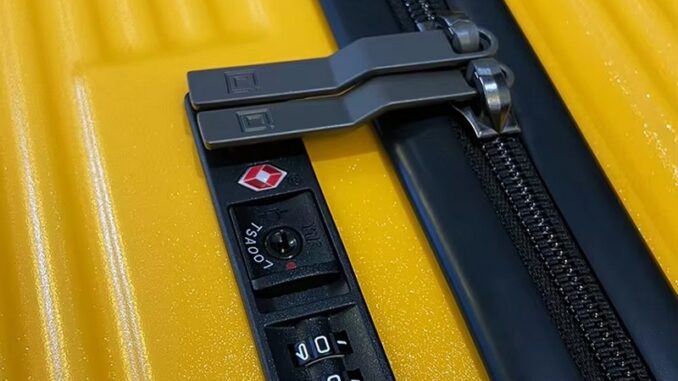
When it comes to travel, securing your belongings is a top priority. The right luggage lock can make the difference between a stress-free journey and one fraught with anxiety over potential theft or damage. With various types of locks available, each offering unique benefits and drawbacks, choosing the right one can be overwhelming. This guide delves into the different types of luggage locks, exploring their features, advantages, and limitations to help you make an informed decision.
1. TSA Locks: The Standard for Air Travel
Overview: TSA (Transportation Security Administration) locks are the most commonly recommended locks for air travel, especially for flights to or within the United States. These locks are designed to be opened by TSA agents using a universal master key, allowing them to inspect your luggage without damaging the lock or your suitcase.
Pros:
Airport Compliance: TSA locks comply with airport security regulations, reducing the risk of your luggage being damaged during inspections.
Global Acceptance: These locks are accepted in many countries beyond the U.S., making them ideal for international travel.
Variety of Options: Available as combination locks, keyed locks, cable locks, and even smart locks with advanced features.
Cons:
Security Concerns: The master key used by TSA agents has been compromised in the past, raising concerns about the overall security of TSA locks.
Limited Application: Primarily useful for air travel; other lock types may be better suited for non-airport contexts.
2. Combination Locks: Convenience Meets Security
Overview: Combination locks are a popular choice for travelers who prefer not to carry keys. These locks require a numerical code to unlock, which can be set and reset as needed.
Pros:
No Keys Needed: Eliminates the risk of losing keys, offering a convenient and reliable way to secure your luggage.
Customizable: The combination can be personalized, and many models allow you to change the code as often as you like.
Widely Available: Available in TSA-approved versions and regular versions, providing flexibility based on your travel needs.
Cons:
Code Vulnerability: If someone observes you entering your combination or if you forget the code, the lock’s security can be compromised.
Limited Resistance: Some lower-quality combination locks can be susceptible to picking or brute force.
3. Keyed Locks: Traditional Security with a Twist
Overview: Keyed locks offer a traditional approach to luggage security, requiring a physical key to unlock. These locks come in a variety of shapes and sizes, from simple padlocks to more sophisticated designs.
Pros:
Simplicity: Easy to use with a straightforward locking mechanism.
Variety: Available in TSA-approved models and more robust, high-security versions.
Reliable: Less vulnerable to tampering compared to some combination locks.
Cons:
Key Management: The primary drawback is the need to keep track of the key. Losing the key can render the lock useless.
Less Flexible: Unlike combination locks, you can’t change the key or its configuration once it’s set.
4. Cable Locks: Flexibility and Versatility
Overview: Cable locks feature a flexible, steel cable that can be threaded through multiple zippers or compartments, offering additional security for luggage with multiple pockets or access points.
Pros:
Flexibility: The cable design allows you to secure multiple zippers or even connect multiple bags together.
Durability: The steel cable is generally more resistant to cutting or tampering compared to traditional padlock shackles.
Portability: Lightweight and easy to carry, making them a practical choice for travelers who need versatility.
Cons:
Limited Use: While effective for securing zippers, cable locks may not be as strong as traditional locks when it comes to resisting forceful attacks.
Potential Bulk: The cable can add bulk, making it less ideal for travelers seeking ultra-compact locking solutions.
5. Smart Locks: High-Tech Security for the Modern Traveler
Overview: Smart locks represent the cutting edge of luggage security, integrating technology such as Bluetooth, fingerprint recognition, and even GPS tracking. These locks are typically controlled via a smartphone app, offering advanced features that go beyond traditional locking mechanisms.
Pros:
High-Tech Features: Smart locks often include features like remote unlocking, biometric access, and tamper alerts, providing a high level of security.
Convenience: No need for keys or combinations; your smartphone becomes the key.
Additional Security: Some models offer GPS tracking, allowing you to monitor your luggage’s location in real-time.
Cons:
Battery Dependency: Most smart locks require batteries, and a dead battery could leave you locked out of your luggage.
Cost: These locks tend to be more expensive than traditional options, reflecting the advanced technology they incorporate.
Compatibility: Ensure the lock is compatible with your smartphone and operating system before purchasing.
6. Padlocks: The Versatile and Timeless Choice
Overview: Padlocks are a versatile option that can be used on a variety of luggage types, including backpacks, suitcases, and duffel bags. They come in both keyed and combination versions, with some models offering TSA compliance.
Pros:
Versatility: Can be used on a wide range of luggage and other items, such as lockers or storage units.
Durability: High-quality padlocks offer robust security and can be resistant to tampering.
Cost-Effective: Padlocks are generally affordable, making them a popular choice for budget-conscious travelers.
Cons:
Bulk: Some padlocks can be bulky, adding weight and taking up space in your luggage.
Limited Functionality: Basic padlocks may not offer the same level of security features as more specialized locks, such as TSA locks or smart locks.
Conclusion: Choosing the Right Lock for Your Travels
Selecting the right luggage lock depends on your travel needs, destination, and personal security preferences. TSA locks are a must for air travel, especially in the U.S., but other options like combination locks, keyed locks, and smart locks offer unique benefits that may better suit your specific situation.
For the tech-savvy traveler, smart locks provide cutting-edge security with convenient features, while traditionalists may prefer the reliability of keyed or combination locks. Ultimately, the best lock for you is one that balances security with convenience, ensuring that your belongings remain safe throughout your journey.
Leave a Reply